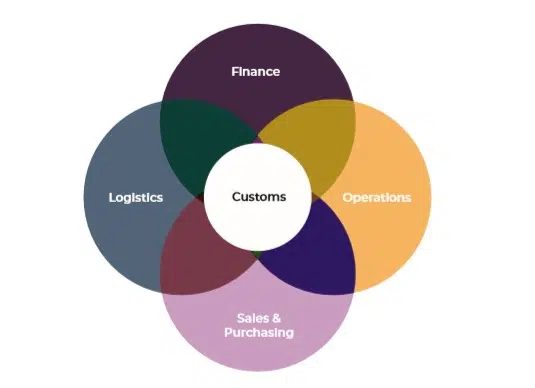Why CFO’s should be concerned about their customs planning strategy
The day-to-day responsibility of customs planning and customs compliance are typically spread across multiple departments whether it be determining the inbound contract and Incoterms or customs declaration process or making key decisions on who takes responsibility for the export.

Lack of responsibility manifests itself in two clear ways
- Panic when HMRC carries out a compliance audit. Clear dis-joins between departments and an inability to coherently show an audit trail, or address the questions raised, leaves the business exposed; and
- A failure of the business to employ customs planning to reduce costs, improve gross margins and working capital management.
The risks are also fuelled by the complexity of the customs duty regulations with the UK introducing over 30 pieces of regulation and customs declarations containing over 50 data elements.
What is the Exposure?
Customs compliance is audit based, with only a small percentage of checks carried out at the time of import or export. Small transactional errors can snowball overtime as customs declarations remain open for at least three years, leading to:
- Assessment of any underpaid customs duties, eroding margins and working capital;
- Penalties up to the value of underpaid duty;
- Removal of customs duty relief regimes;
- Supply-chain delays;
- Reputational damage to risk score; and
- Failure to meet Senior Accounting Officer (SAO) provisions.
Why is this a Finance issue?
A common misconception is that the responsibility of Customs Duty does not fall within the Finance department as it not seen a “real tax”. It is clear from the Finance Act 2009 that HMRC see customs compliance as a tax and, therefore, a Finance issue as it is specifically within the definition of taxes for the purpose of Senior Accounting Officer (SAO).
CFO’s for businesses with over £200m turnover will be familiar with the SAO provisions which require them to take personal responsibility “to ensure their company establishes and maintains appropriate tax accounting arrangements to allow tax liabilities to be calculated accurately in all material respects”.
Customs Duty very much falls within this remit (see here) and HMRC guidance provides some examples as to how this applies in practice (see here for core elements and here for processes). Failure to meet this duty will leave the CFO exposed to personal fixed penalties of £5,000 and reputational damage above and beyond the exposures listed above.
CFO’s not yet caught by the SAO provisions will want to keep an eye on the £200m threshold as this is likely to be lowered over time. Further, a key part of the role of CFO is to be the guardian of the company, and meeting the SAO provisions across all taxes is seen as good practice.
Aside from the SAO provisions and HMRC’s view that ultimate responsibility for customs sits with Finance, there are other reasons for control to be exercised here, including:
- Finance is seen as the Guardian of the Company, likely to have a better understanding of regulatory control and dealing with HMRC
- Customs planning is aligned with Finance KPI of Margin Improvement and Working capital
- Finance is likely to have a better reach across all other business departments to pull the audit trail together.
With most businesses we speak to not having a clear strategy in place to monitor and test this area, this could be a major issue that firms are sleep walking into in a post Brexit environment.
Post Brexit Impact
Brexit has had a huge impact on business’s customs planning and compliance over and above the obvious increase in the scope of movements now subject to customs regulation and control, including:
- The increase in materiality of exposure and opportunity to reduce customs duty costs in line with the value of imports/exports and number of customs declarations;
- Changes in contracts and supply chains;
- The complexity of new UK regulations, where we have moved from three core pieces of EU regulation to over 30 pieces of UK regulation.
There is also the key unknown as to how HMRC policy and resources will be applied to customs duties. 85% of customs duties collected by the UK prior to Brexit flowed back to the EU Commission. These revenues will now all belong to the UK Exchequer. It would be prudent to assume that this is an area which will be policed more aggressively going forward especially at a time where public borrowing is high and weighted with furlough payments. Many of our clients have already received letters from HMRC’s Tariff Preference team to instigate enquires around compliance to the new Trade Cooperation Agreement (TCO).
Solutions
We advise all CFO’s, in particular SAO’s, to get a handle on their customs planning strategy and mitigate any risk within the current structure. This should start with understanding your obligations and mapping these against your current processes.
Barbourne Brook can help you speed this process up by:
Performing full customs audits
giving clarity on the wider strategy, allowing you to address issues before they become serious and reduce costs and recover over payments
Building best practice
for ongoing management through a clear audit trail, Standard Operating Procedures (SOPs) to manage the establishment and maintenance of master customs data and the process of making customs declarations
Providing ongoing Management Support
including customs data analytics, updates on customs developments, regular meetings and ad-hoc support to future proof customs compliance
Related Posts
16 July 2025
Protected: Fear, Avoidance, and Customs Compliance: What CFO’s Should Know
Many CFOs quietly acknowledge that…
15 July 2025
Customs Unsung Heroes: Why Finance Teams Should Stop Overlooking Their Customs Function
In many businesses, the customs team…
30 June 2025
Is Your Customs Function Truly Under Control? A Quiet Risk Finance Leaders Can’t Ignore
In most businesses, customs compliance…


